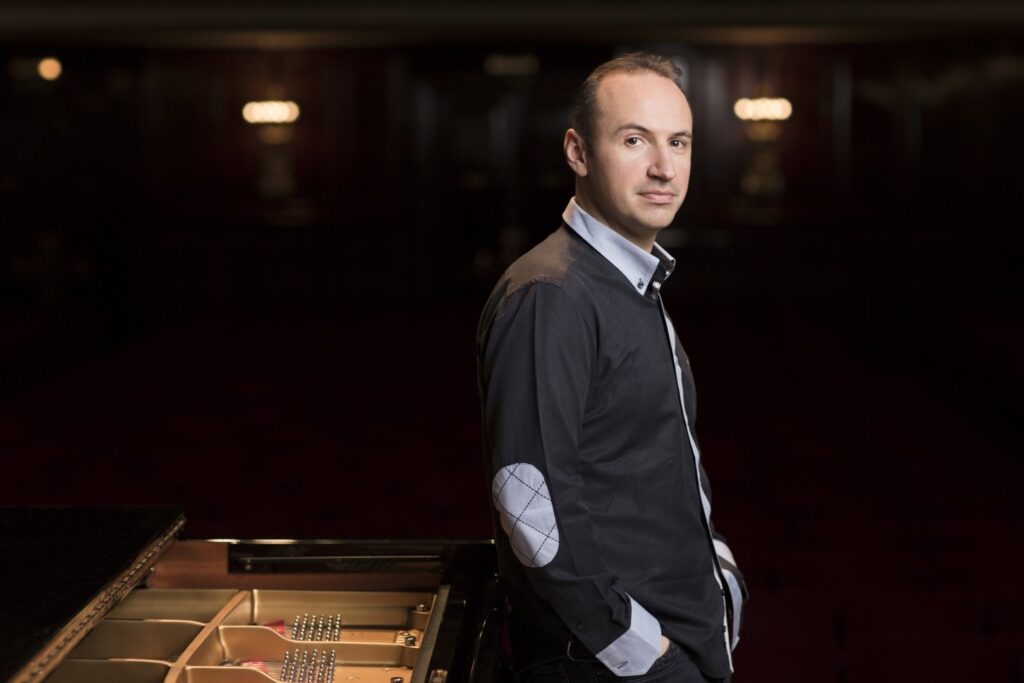Simon Trpčeski’s “Stalingrad” reprise as powerful the second time around

Simon Trpčeski performed at Coral Gables Congregational Church on Tuesday in a recital presented by Friends of Chamber Music of Miami. Photo: B.Ealovega/KulturOp
Simon Trpĉeski set the South Florida concert scene ablaze last spring with his commanding performance of Prokofiev’s Sonata No. 7 in B-flat Major. The Macedonian pianist returned to the Friends of Chamber Music on Tuesday night and, once again, his program culminated with this fiery wartime opus. Playing the excellent Bösendorfer grand at Coral Gables Congregational United Church of Christ, Trpĉeski’s musical instincts could be quirky and eccentric but always interesting, and there was no question of his virtuosity.
In his retical opener on Tuesday, Mozart’s Variations on “Salve tu, Domine,” Trpĉeski’s approach tended toward the percussive, coming up somewhat short on grace. He was much more successful later on with the Salzburg master’s 8 Variations in A Major on “Come un agnello.” Trpĉeski’s effervescent statement of the theme presaged and epic, bravura treatment of the variants, with hand crossings and rapid passages smoothly coordinated, and the aristocratic mood skillfully conveyed.
Between the Mozarts, Trpĉeski ventured Chopin’s Four Mazurkas. Despite some deftness of touch, his slow tempo in the Mazurka No. 1 in G minor lacked a suitably dance-like pulse. His fleet, propulsive C Major mazurka, played next, was the most successful of the quartet. The A-flat Major (no. 3) was lightly dispatched, but Trpĉeski’s approach seemed superficial and that posture carried over into the rapid clip of the final B-flat minor mazurka.
Two less frequently played Beethoven works made up the recital’s second half, and seemed to be a more congenial match for the pianist. He imbued the master from Bonn’s 12 Variations on a Russian Theme with appropriate wit, gravitas, delicacy and pianistic thunder. Beethoven’s 32 Variations on an Original Theme in C minor found Trpĉeski in titanic mode, the main subject stated in a severe and stern manner. Fast sections hurtled forward, and triplets were dispatched with agility, while slower passages took on depth and resonance.
The evening’s finale is often referred to as Prokofiev’s “Stalingrad” sonata. The 1944 score depicts a Russia under siege and struggling to survive the carnage and horrors of an unprovoked invasion by Nazi Germany. Premiered by Sviatoslav Richter and introduced to America in 1945 by Vladimir Horowitz, it is a pillar of recital repertoire — and of late an implicit critique of modern-day Russia ignoring the lessons of its own history.
Trpĉeski last played it here at the Wertheim Performing Arts Center, not two full months after Russia’s invasion of Ukraine. Then, as now, Trpĉeski matched those 20th Century keyboard giants in flawless technique and ability to bring Prokofiev’s grim opus to vivid life. There was a devilish intensity in the initial Allegro inquieto, which rang true to its markings in Trpĉeski forte dynamism. The harrowing, warlike martial motif was fully realized, its fistfuls of notes assayed with lethal accuracy. The secondary theme, taken at a measured pace, provided contrast and respite before the headlong fury of the movement’s closing bars.
Thematic fragments of the second movement Andante caloroso recall the lyricism of Prokofiev’s ballet scores. Under Trpĉeski’s fingers, these seeming recollections of better times emerged spacious and flowing, but with the underlying tension still closely felt. The final, knuckle-busting Precipitato movement saw the player’s hands flying, yet with the concluding chords abrupt and still managing to shock — and the dissonance and fury of Prokofiev’s discourse fully conveyed.
Repeated standing ovations from an audience that included the pianist’s family brought Trpĉíeski back for a generous set of encores. Paprika’s Dance by Macedonian composer Tale Ognenovskiu was a lithe romp. A Prokfiev march showcased the “Stalingrad” composer’s lighter populist side. Chopin’s Mazurka in A minor yielded a poetry that had eluded Trpĉeski in the earlier mazurkas. A soft, ruminative reading of Mozart’s Duper variations was followed immediately, without pause, by a patrician account of the third movement Menuetto of Beethoven’s Sonata No. 18 in E-flat Major, which made one eager to hear this artist venture a complete Beethoven sonata. Next year, perhaps.
Friends of Chamber Music and Piano Lovers present Asiya Korepanova playing Rachmaninoff’s Etudes-Tableaux 8 p.m. May 16 at Coral Gables Congregational United Church of Christ. miamichambermusic.org
Posted in Performances
Leave a Comment
Wed May 3, 2023
at 12:16 pm
No Comments






